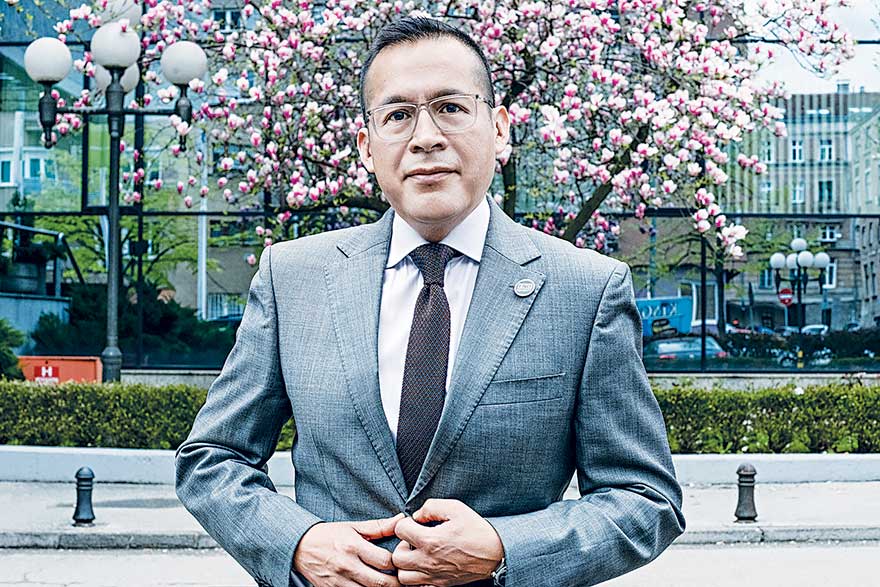Over the medium and long term, the focus must be on improving the economy’s resilience by addressing its internal and external imbalances and boosting productivity growth. While we expect growth to rebound in 2021, as the economy recovers, the timing and pace of recovery is highly uncertain.
Montenegro will face a strong recession due to COVID-19. We discussed the short- and long-term implications of this situation with Emanuel Salinas, World Bank Country Manager for Bosnia-Herzegovina and Montenegro. “Let me start by saying that the economic crisis caused by COVID-19 is the deepest that the world has seen since World War II. We are still in the midst of the crisis and uncertainty is high. The strong second wave of the pandemic has put health systems under significant pressure, which prompted partial or complete lock-downs in many countries. The hardest hit are the countries with a large share of the service sector, such as Montenegro,” says our interlocutor.
“Montenegro’s heavy reliance on tourism, high public debt and limited fiscal buffers, as well as a lack of monetary policy, amplify its vulnerabilities. We estimate that Montenegro’s economy will contract by 12.4% in 2020, but there is a risk that this number could be higher.”
According to Salinas, the short-term implications of the crisis are increasingly evident. “Firstly, human losses due to COVID-19 are high and increasing, and health systems are under significant pressure. Secondly, the measures to contain the pandemic resulted in an unprecedented loss of economic activity, especially in the tourism and hospitality sectors, which are source of jobs for many Montenegrins. Government support measures saved many jobs so far, but employment had nevertheless fallen by over 11 per cent by September. Thirdly, the crisis has reversed poverty reduction gains and welfare improvements; up to 20,000 people may fall into poverty, although government cash transfers cushioned the impact on the most vulnerable. Lastly, the crisis has strained public finances and will result in a surge in public debt, requiring very careful fiscal management in the medium term.”
How will the recession influence the level of public debt to GDP, and what options are at hand?
– High public debt remains a major concern – increasingly so in the context of the current financial shock. Even before the crisis, Montenegro’s debt burden was very high, but was expected to decline in the medium term. The crisis has, however, diverted Montenegro from its debt reduction path and brought debt sustainability issues to the fore, given higher debt service costs. Public debt is estimated to increase to exceed 90 per cent of GDP in 2020, as a result of increased borrowing due to the crisis, but also because of a strong GDP contraction. Given its large fiscal imbalances and financial market conditions worsening in a global recession, Montenegro will need to adjust public spending.
How well has the government responded to the crisis?
– The government adopted a broad set of support measures to mitigate the impact of the crisis. The scope of support, however, reflects the tight fiscal space the country has, i.e. how much money is actually available to respond to the needs created by the crisis. These measures included, among others, wage subsidies to the hardest hit sectors, IDF credit lines, cash transfers to the most vulnerable and additional support for the tourism and agriculture sectors. Though the measures, which tracked most EU policy responses, were well-targeted, a share of the vulnerable population – depending on the informal sector – may have received little support. Efforts are needed to identify this group of people and help them to maintain their livelihoods.
The government also presented a mediumterm investment plan to support post-COVID economic recovery. However, it will need to reassess its medium-term fiscal strategy in order to achieve a balance between fiscal support for recovery and fiscal consolidation, adapting to a new reality that is still largely uncertain.
The junction of the economic crisis brought about by the COVID-19 pandemic and the political change are a source of uncertainty, but at the same time represent an opportunity to build a stronger and more resilient economy
If the need exists for fiscal policy to be further tightened, how will this impact on large infrastructure development projects?
– Overall policy space is tight, as Montenegro has no monetary flexibility, and its fiscal space has been largely exhausted, while public debt is expected to increase above 90 per cent of GDP. In 2021–22 amortisation of €745 million in public debt (15 per cent of 2021 GDP) is due, putting further pressure on public finance. Current inefficiencies in public spending leave room for expenditure adjustments that could create additional fiscal space by, for example, speeding up public administration reform, strengthening public investment management and continuing the reform of public procurement. The successful implementation of the fiscal consolidation programme is thus critical to creating more space over the medium-term to direct public spending towards areas that improve the quality of public services, such as infrastructure investments and social services.
Public investment is critical to foster inclusive growth and development and build resilient and green infrastructure. Once the priority section of the highway is completed, fiscal pressures will ease. However, Montenegro has no fiscal space to embark on the completion of the remaining sections of the highway through its own financing, while further borrowing would jeopardise public debt sustainability. The need for fiscal consolidation in the coming years may weigh on public investment, but increasing its efficiency can compensate. And the efficiency can increase through improved public investment management that would identify priority projects with large economic and social returns.

How have the big players in tourism handled the crisis and how will this influence Montenegrin plans for FDI in the tourism sector?
– COVID-19 and the measures to contain the public health crisis present an unprecedented challenge, with the leisure and hospitality sectors suffering a devastating effect. An almost complete collapse of international travel and tourism has taken place since late March. The tourism sector has, thus, been the hardest hit and will face more lasting effects of COVID-19 than other sectors. Its recovery depends largely on when the pandemic is contained and a vaccine is available, but also on consumer behaviour and preferences that might have changed permanently. Also, tourism is heavily reliant on SMEs, which might find survival more challenging than SMEs in other sectors.
Montenegro has seen the worst tourism season on record: in the first nine months of 2020, the number of overnight stays of foreign tourists stood at just 14 per cent of the 2019 total, while employment in food and accommodation services fell by 28 per cent. To date, the tourism and energy sectors have been large sources of economic growth and have attracted foreign investment. Montenegro has so far largely attracted FDI that comes to a country seeking natural resources (mostly real estate), but going forward the government should put efforts into attracting FDI that comes to a country as part of global value chains and for exports. This type of investment can help Montenegro upgrade its industries and create better jobs, as well as fostering sustainable, inclusive and green growth.
We have offered financial assistance to mitigate the negative impact of the pandemic on the healthcare sector and the livelihoods of the most vulnerable people in the country
Is it time to reconsider the Montenegrin growth model, which relies mostly on tourism, or is this direction still the right one despite the crisis?
– The time of the crisis is also a point of reflection. Even though we are still in the middle of the crisis and the governments of the region are mostly focused on mitigating the immediate negative impact, a longer-term perspective must not be lost from sight. As I mentioned, the crisis only exacerbated Montenegro’s key vulnerabilities, such as a lack of diversification of the economy, a lack of fiscal space due to high public debt, a low production base and high import dependence of investment and consumption.
The pandemic has brought lasting disruption. What seemed to be a temporary shock back in April is now an obvious structural change. The challenge is how to build back, but not back to what we used to have before the crisis, but to build back in a better way. But this requires a long-term vision and planning, and determination to redirect the economy and solve the problems that were there even before the crisis. For Montenegro, this means strengthening its resilience through a broad-based, productivity-based and export-orientated growth model. However, this is not possible without a level playing field for businesses that enhances competition, innovation and research, and that creates higher quality and higher paying jobs; service- and merit-based public administration and an efficient welfare system; investments in human resources and green and digital infrastructure that further creates economic opportunities, but at the same time preserves natural resources.
Under such circumstances, what can the World Bank do to alleviate the pressure of the crisis?
– We have been working closely with the authorities to respond swiftly to the increased challenges created by this crisis. Our focus to date has been on the folowing main areas: Firstly, we have provided real-time advice to the Ministry of Finance and other authorities on options, programmes and policies that can be put in place to mitigate the impact of the crisis on people, enterprises and the economy.

Secondly, we have contributed to enhancing the ability of the authorities to respond to the impact of the crisis by helping the government to raise €250 million in financing. We did this by providing a guarantee for €80 million, which created confidence among commercial lenders to lend to Montenegro for longer maturities and at a lower cost. As part of the guarantee, we worked with the authorities to put in place reforms that are necessary to improve fiscal sustainability.
How will current trends impact on the World Bank’s overall engagement in Montenegro in 2021?
– The reforms Montenegro embarked on before the crisis should remain on the agenda, while their implementation should be intensified to ensure macroeconomic stability, create economic opportunities and ensure strong private sector-led growth that would benefit all Montenegrins. The World Bank has been supporting Montenegro on the implementing of reforms for better and inclusive growth. The junction of the economic crisis brought about by the COVID-19 pandemic and the political change are a source of uncertainty, but at the same time represent an opportunity to build a stronger and more resilient economy. The World Bank stands ready to provide support to Montenegro on this path and is looking forward to more intensive engagement with the government in supporting post-COVID recovery.
The 2016-2021 Country Partnership Framework (CPF) between the World Bank and the Government of Montenegro is a medium-term strategy that provides a framework for the Bank’s engagement in the country and expires next year. A new CPF will be prepared for the 2022-2026 period and will result in a World Bank medium-term programme that fully reflects the development agenda of Montenegro and the priorities jointly agreed with the government.
| SUPPORT The World Bank is looking forward to more intensive engagement with the government in supporting post- COVID recovery. | RECOMMENDATION The government should exert efforts to attract FDI that comes to a country as part of global value chains and for exports. | RECOVERY Vigilant debt management and a tighter fiscal stance will be needed to place Montenegro on a firm and accelerated debt reduction trajectory as recovery takes hold. |
|---|